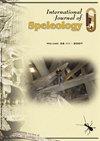东阿尔卑斯主要洞穴系统的流态演化(Hirlatzhöhle, Dachstein)
IF 1.3
4区 地球科学
Q3 GEOSCIENCES, MULTIDISCIPLINARY
引用次数: 3
摘要
116公里长,1560米深Hirlatzhöhle是北钙质阿尔卑斯山(NCA;奥地利)。它位于达赫施泰因的西北部分,这是一个广阔的喀斯特地块,占地576平方公里,最高点海拔2995米。与NCA的大多数其他洞穴相比,Hirlatzhöhle包括位于基准面上方1公里的古老(epi)潜水通道以及两个现代主要排水系统。本研究的目的是结合洞穴的形成,确定古流动条件和活动流动条件,以及Hirlatzhöhle洞穴层的年龄。我们使用形态学和沉积学研究以及与其他洞穴的相关性。与NCA的洞穴系统的另一个不同之处在于,Hirlatzhöhle的大多数通道不是在所谓的1200到1800米之间的巨型洞穴层内开发的,而是在800到1300米之间。Hirlatzhöhle的大部分是在地表条件下形成的,如细沟和冷凝腐蚀冲天炉,这是NCA中许多其他洞穴系统的情况。相比之下,像峡谷和顶槽这样的共生特征相对较少,不溶性沉积物也相对较少。扇贝呈细长状,表明水流速度高,砂质沉积物丰富。与附近Dachstein-Mammuthöhle及其以东的其他洞穴显示的西向古流相反,Hirlatzhöhle的扇贝显示的是东向古流和自生补给。现代排水是自生的,也是由N向ne向的。尽管对Hirlatzhöhle的埋葬年代测定还没有给出合理的结果,但与其他邻近洞穴的对比表明,主要的古潜水层的年龄是上新世晚期到更新世早期。这是由流岩的无限U-Th年龄(>0.6 Ma)支持的。本文章由计算机程序翻译,如有差异,请以英文原文为准。
Flow regime evolution of a major cave system in the Eastern Alps (Hirlatzhöhle, Dachstein)
The 116 km-long and 1560 m-deep Hirlatzhöhle is one of the major cave systems in the Northern Calcareous Alps (NCA; Austria). It is located in the NW part of the Dachstein, an extensive karst massif encompassing 576 km² with its highest point at 2995 m a.s.l. In contrast to most other caves in the NCA, Hirlatzhöhle comprises old (epi)phreatic passages located up to 1 km above the base level as well as two modern major drainage systems. The aim of this study is to define the palaeo- and the active flow conditions in combination with speleogenesis, and the age of the cave levels of Hirlatzhöhle. We use morphological as well as sedimentological studies and correlations with other caves. Another difference from cave systems in the NCA is that the majority of passages in Hirlatzhöhle are not developed within the so-called Giant Cave Level between 1200 and 1800 m a.s.l., but deeper between 800 and 1300 m. Most parts of Hirlatzhöhle developed under epiphreatic conditions as indicated by rills and condensation corrosion cupolas, which is the case for much other cave systems in the NCA. In contrast, paragenetic features like canyons and ceiling channels are relatively rare as are insoluble sediments. Elongated scallops indicate that flow velocities were high and abrasive sediments were abundant. Opposite to the nearby Dachstein-Mammuthöhle and other caves east of it that show a west-directed palaeo-flow, scallops in Hirlatzhöhle indicate a NE-directed palaeo-flow and an autogenic recharge. Modern drainage is autogenic and N- to NE-directed as well. Even though burial age dating did not give reasonable results for Hirlatzhöhle yet, the correlation with other adjacent caves suggests a Late Pliocene to Early Pleistocene age of the main palaeo-phreatic level. This is supported by an infinite U-Th age (>0.6 Ma) of a flowstone.
求助全文
通过发布文献求助,成功后即可免费获取论文全文。
去求助
来源期刊

International Journal of Speleology
地学-地球科学综合
CiteScore
3.10
自引率
23.10%
发文量
12
审稿时长
>12 weeks
期刊介绍:
The International Journal of Speleology has the aim to get cave and karst science known to an increasing number of scientists and scholars. The journal therefore offers the opportunity to all scientists working in and on karst to publish their original research articles or their review papers in an open access, high quality peer reviewed scientific journal at no cost. The journal offers the authors online first, open access, a free PDF of their article, and a wide range of abstracting and indexing services.
 求助内容:
求助内容: 应助结果提醒方式:
应助结果提醒方式:


